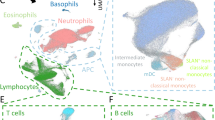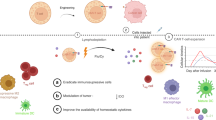Abstract
Immunodeficiency is a barrier to successful vaccination in individuals with cancer and chronic infection. We performed a randomized phase 1/2 study in lymphopenic individuals after high-dose chemotherapy and autologous hematopoietic stem cell transplantation for myeloma. Combination immunotherapy consisting of a single early post-transplant infusion of in vivo vaccine-primed and ex vivo costimulated autologous T cells followed by post-transplant booster immunizations improved the severe immunodeficiency associated with high-dose chemotherapy and led to the induction of clinically relevant immunity in adults within a month after transplantation. Immune assays showed accelerated restoration of CD4 T-cell numbers and function. Early T-cell infusions also resulted in significantly improved T-cell proliferation in response to antigens that were not contained in the vaccine, as assessed by responses to staphylococcal enterotoxin B and cytomegalovirus antigens (P < 0.05). In the setting of lymphopenia, combined vaccine therapy and adoptive T-cell transfer fosters the development of enhanced memory T-cell responses.
This is a preview of subscription content, access via your institution
Access options
Subscribe to this journal
Receive 12 print issues and online access
$259.00 per year
only $21.58 per issue
Buy this article
- Purchase on SpringerLink
- Instant access to the full article PDF.
USD 39.95
Prices may be subject to local taxes which are calculated during checkout



Similar content being viewed by others
References
Anderson, K.C. et al. T-cell-depleted autologous bone marrow transplantation therapy: analysis of immune deficiency and late complications. Blood 76, 235–244 (1990).
Guillaume, T., Rubinstein, D.B. & Symann, M. Immune reconstitution and immunotherapy after autologous hematopoietic stem cell transplantation. Blood 92, 1471–1490 (1998).
Porrata, L.F. et al. Early lymphocyte recovery predicts superior survival after autologous hematopoietic stem cell transplantation in multiple myeloma or non-Hodgkin lymphoma. Blood 98, 579–585 (2001).
Dhodapkar, M.V., Krasovsky, J. & Olson, K. T cells from the tumor microenvironment of patients with progressive myeloma can generate strong, tumor-specific cytolytic responses to autologous, tumor-loaded dendritic cells. Proc. Natl Acad. Sci. USA 99, 13009–13013 (2002).
Noonan, K. et al. Activated marrow-infiltrating lymphocytes effectively target plasma cells and their clonogenic precursors. Cancer Res. 65, 2026–2034 (2005).
Li, L., Yee, C. & Beavo, J.A. CD3- and CD28-dependent induction of PDE7 required for T cell activation. Science 283, 848–851 (1999).
Boussiotis, V.A. et al. p27kip1 functions as an anergy factor inhibiting interleukin 2 transcription and clonal expansion of alloreactive human and mouse helper T lymphocytes. Nat. Med. 6, 290–297 (2000).
Levine, B.L. et al. Adoptive Transfer of Costimulated CD4+ T cells Induces Expansion of Peripheral T Cells and Decreased CCR5 Expression in HIV Infection. Nat. Med. 8, 47–53 (2002).
Laport, G.G. et al. Adoptive transfer of costimulated T cells induces lymphocytosis in patients with relapsed/refractory non-Hodgkin lymphoma following CD34+-selected hematopoietic cell transplantation. Blood 102, 2004–2013 (2003).
Rapoport, A.P. et al. Molecular remission of CML after autotransplantation followed by adoptive transfer of costimulated autologous T cells. Bone Marrow Transplant. 33, 53–60 (2004).
Black, S. et al. Efficacy, safety and immunogenicity of heptavalent pneumococcal conjugate vaccine in children. Northern California Kaiser Permanente Vaccine Study Center Group. Pediatr. Infect. Dis. J. 19, 187–195 (2000).
Gandhi, M.K. et al. Antibody responses to vaccinations given within the first two years after transplant are similar between autologous peripheral blood stem cell and bone marrow transplant recipients. Bone Marrow Transplant. 28, 775–781 (2001).
Guinan, E.C. et al. Polysaccharide conjugate vaccine responses in bone marrow transplant patients. Transplantation 57, 677–684 (1994).
Romero-Steiner, S. et al. Reduction in functional antibody activity against Streptococcus pneumoniae in vaccinated elderly individuals highly correlates with decreased IgG antibody avidity. Clin. Infect. Dis. 29, 281–288 (1999).
Jokinen, J.T., Ahman, H., Kilpi, T.M., Makela, P.H. & Kayhty, M.H. Concentration of antipneumococcal antibodies as a serological correlate of protection: an application to acute otitis media. J. Infect. Dis. 190, 545–550 (2004).
Jodar, L. et al. Serological criteria for evaluation and licensure of new pneumococcal conjugate vaccine formulations for use in infants. Vaccine 21, 3265–3272 (2003).
Powers, D.C., Anderson, E.L., Lottenbach, K. & Mink, C.M. Reactogenicity and immunogenicity of a protein-conjugated pneumococcal oligosaccharide vaccine in older adults. J. Infect. Dis. 173, 1014–1018 (1996).
Shelly, M.A. et al. Comparison of pneumococcal polysaccharide and CRM197-conjugated pneumococcal oligosaccharide vaccines in young and elderly adults. Infect. Immun. 65, 242–247 (1997).
Lottenbach, K.R. et al. Age-associated differences in immunoglobulin G1 (IgG1) and IgG2 subclass antibodies to pneumococcal polysaccharides following vaccination. Infect. Immun. 67, 4935–4938 (1999).
Shelly, M.A., Pichichero, M.E. & Treanor, J.J. Low baseline antibody level to diphtheria is associated with poor response to conjugated pneumococcal vaccine in adults. Scand. J. Infect. Dis. 33, 542–544 (2001).
Kamboj, K.K., Kirchner, H.L., Kimmel, R., Greenspan, N.S. & Schreiber, J.R. Significant variation in serotype-specific immunogenicity of the seven-valent Streptococcus pneumoniae capsular polysaccharide-CRM197 conjugate vaccine occurs despite vigorous T cell help induced by the carrier protein. J. Infect. Dis. 187, 1629–1638 (2003).
Hakim, F.T. et al. Age-dependent incidence, time course, and consequences of thymic renewal in adults. J. Clin. Invest. 115, 930–939 (2005).
Uchida, T., Pappenheimer, A.M. Jr & Greany, R. Diphtheria toxin and related proteins. I. Isolation and properties of mutant proteins serologically related to diphtheria toxin. J. Biol. Chem. 248, 3838–3844 (1973).
Borrello, I. et al. Sustaining the graft-versus-tumor effect through posttransplant immunization with granulocyte-macrophage colony-stimulating factor (GM-CSF)-producing tumor vaccines. Blood 95, 3011–3019 (2000).
Teshima, T. et al. Tumor cell vaccine elicits potent antitumor immunity after allogeneic T-cell-depleted bone marrow transplantation. Cancer Res. 61, 162–171 (2001).
Overwijk, W.W. et al. Tumor regression and autoimmunity after reversal of a functionally tolerant state of self-reactive CD8+ T cells. J. Exp. Med. 198, 569–580 (2003).
Singhal, S. & Mehta, J. Reimmunization after blood or marrow stem cell transplantation. Bone Marrow Transplant. 23, 637–646 (1999).
Nordoy, T. et al. Humoral immunity to viral and bacterial antigens in lymphoma patients 4–10 years after high-dose therapy with ABMT. Serological responses to revaccinations according to EBMT guidelines. Bone Marrow Transplant. 28, 681–687 (2001).
Jones, R.J. et al. Induction of graft-versus-host disease after autologous bone marrow transplantation. Lancet 1, 754–757 (1989).
Vavassori, M. et al. Restricted TCR repertoire and long-term persistence of donor-derived antigen-experienced CD4+ T cells in allogeneic bone marrow transplantation recipients. J. Immunol. 157, 5739–5747 (1996).
Kirschner, D. & Panetta, J.C. Modeling immunotherapy of the tumor-immune interaction. J. Math. Biol. 37, 235–252 (1998).
Eaton, S.M., Burns, E.M., Kusser, K., Randall, T.D. & Haynes, L. Age-related defects in CD4 T cell cognate helper function lead to reductions in humoral responses. J. Exp. Med. 200, 1613–1622 (2004).
Molrine, D.C. et al. Donor immunization with pneumococcal conjugate vaccine and early protective antibody responses following allogeneic hematopoietic cell transplantation. Blood 101, 831–836 (2003).
Antin, J.H. et al. Protective antibody responses to pneumococcal conjugate vaccine after autologous hematopoietic stem cell transplantation. Biol. Blood Marrow Transplant. 11, 213–222 (2005).
Dummer, W. et al. T cell homeostatic proliferation elicits effective antitumor autoimmunity. J. Clin. Invest. 110, 185–192 (2002).
Janssen, E.M. et al. CD4+ T-cell help controls CD8+ T-cell memory via TRAIL-mediated activation-induced cell death. Nature 434, 88–93 (2005).
Heitger, A. et al. Defective T-helper cell function after T-cell-depleting therapy affecting naive and memory populations. Blood 99, 4053–4062 (2002).
Shinefield, H.R. et al. Safety and immunogenicity of heptavalent pneumococcal CRM197 conjugate vaccine in infants and toddlers. Pediatr. Infect. Dis. J. 18, 757–763 (1999).
Eskola, J. et al. Efficacy of a pneumococcal conjugate vaccine against acute otitis media. N. Engl. J. Med. 344, 403–409 (2001).
de Aristegui, F.J. et al. Evaluation of the safety and immunogenicity of pneumococcal seven-valent conjugate vaccine (Prevenar) administered in previously unvaccinated Spanish children aged 24 to 36 months. Vaccine 23, 1917–1922 (2005).
Ekstrom, N. et al. Kinetics and avidity of antibodies evoked by heptavalent pneumococcal conjugate vaccines PncCRM and PncOMPC in the Finnish Otitis Media Vaccine Trial. Infect. Immun. 73, 369–377 (2005).
Alexanian, R., Dimopoulos, M.A., Delasalle, K. & Barlogie, B. Primary dexamethasone treatment of multiple myeloma. Blood 80, 887–890 (1992).
Levine, B.L. et al. Effects of CD28 costimulation on long term proliferation of CD4+ T cells in the absence of exogenous feeder Cells. J. Immunol. 159, 5921–5930 (1997).
Concepcion, N.F. & Frasch, C.E. Pneumococcal type 22f polysaccharide absorption improves the specificity of a pneumococcal-polysaccharide enzyme-linked immunosorbent assay. Clin. Diagn. Lab. Immunol. 8, 266–272 (2001).
Wells, A.D., Gudmundsdottir, H. & Turka, L.A. Following the fate of individual T cells throughout activation and clonal expansion. Signals from T cell receptor and CD28 differentially regulate the induction and duration of a proliferative response. J. Clin. Invest. 100, 3173–3183 (1997).
Novak, E.J., Liu, A.W., Nepom, G.T. & Kwok, W.W. MHC class II tetramers identify peptide-specific human CD4(+) T cells proliferating in response to influenza A antigen. J. Clin. Invest. 104, R63–R67 (1999).
Blade, J. et al. Criteria for evaluating disease response and progression in patients with multiple myeloma treated by high-dose therapy and haemopoietic stem cell transplantation. Myeloma Subcommittee of the EBMT. European Group for Blood and Marrow Transplant. Br. J. Haematol. 102, 1115–1123 (1998).
Acknowledgements
We thank R. Vonderheide, R. Carroll and J Riley for advice and intellectual assistance; M. Pohl and T. Yates for assistance with clinical data management, K. Grandfield, L. Winestone, M. Shalwala and A. Cannon for technical assistance, and H. Standiford, J. Karp, L. Schuchter, D. Molrine and H. Hamilton for serving on the Data Safety and Monitoring Committee, C. Hass for administrative assistance. We received support from a Specialized Center of Research and Clinical Scholars Award supported by the Leukemia and Lymphoma Society of America, National Institute of Allergy and Infectious Diseases contract no. N01-AI-85342 US National Cancer Institute grant R21 CA101356-2 and a Fellows' Grant from the Multiple Myeloma Research Foundation.
Author information
Authors and Affiliations
Corresponding authors
Ethics declarations
Competing interests
Carl June is the founder of Xcyte Therapies, Inc. He receives no personal financial compensation from Xcyte Therapies and does not own stock in Xcyte Therapies.
Bruce Levine is a consultant for Xcyte Therapies.
The clinical trial and studies presented in this manuscript were not in any part funded by Xcyte Therapies.
Supplementary information
Supplementary Fig. 1
Characteristics of the adoptively transferred cells. (PDF 23 kb)
Supplementary Fig. 2
Effect of early T-cell infusion on numeric T-cell recovery. (PDF 96 kb)
Supplementary Fig. 3
Kaplan-Meier plots of event-free survival and overall survival for all study patients (n = 53). (PDF 24 kb)
Rights and permissions
About this article
Cite this article
Rapoport, A., Stadtmauer, E., Aqui, N. et al. Restoration of immunity in lymphopenic individuals with cancer by vaccination and adoptive T-cell transfer. Nat Med 11, 1230–1237 (2005). https://doi.org/10.1038/nm1310
Received:
Accepted:
Published:
Issue date:
DOI: https://doi.org/10.1038/nm1310
This article is cited by
-
Prevention and treatment of relapse after stem cell transplantation with immunotherapy
Bone Marrow Transplantation (2018)
-
Current treatment options of T cell-associated immunotherapy in multiple myeloma
Clinical and Experimental Medicine (2017)
-
Boosting humoral and cellular immunity to pneumococcus by vaccination before and just after autologous transplant for myeloma
Bone Marrow Transplantation (2016)
-
A comparison between cytokine- and bead-stimulated polyclonal T cells: the superiority of each and their possible complementary role
Cytotechnology (2016)
-
The Society for Immunotherapy of Cancer consensus statement on immunotherapy for the treatment of hematologic malignancies: multiple myeloma, lymphoma, and acute leukemia
Journal for ImmunoTherapy of Cancer (2016)



